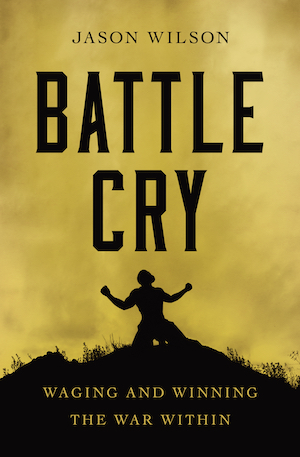Embracing Emotions for a More Christ-Like Perspective: Dr. Gary Chapman and Jason Wilson
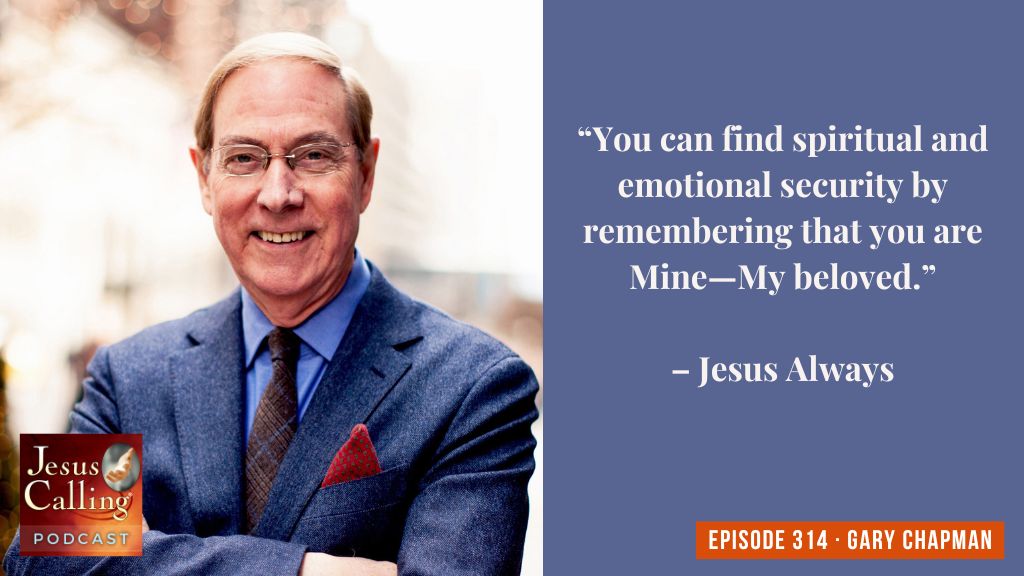
Dr. Gary Chapman: One of our deepest emotional needs is to feel loved, and that’s whether you’re Christian or whether you’re not a Christian. We’re all made in God’s image. And because of that, we have the ability to love and we have the capacity to receive love.
Embracing Emotions for a More Christ-Like Perspective: Dr. Gary Chapman and Jason Wilson – Episode #314
Narrator: Welcome to the Jesus Calling Podcast. Emotions can be a sticky topic for Christians. While most of us know having a healthy range of emotions is good for us and those we love, we are often dissuaded from leaning too much into our emotions or feelings for the fear of becoming swept away by them, and distracted from our calling. But Jesus shows us a true picture of how emotions can give us perspective and language for relating to ourselves and others. He shows the gamut of emotions from anger to those who are exploiting the things of God for their own gain, to compassion for the Samaritan woman at the well who had been discarded by her people (John 4 NIV). Jesus exemplified how our emotions can inform us as to how we show up in the world, and having a healthy balance of emotions keeps us in touch with ourselves and others.
This week’s guests discuss emotions from two different perspectives. Dr. Gary Chapman looks at his seminal work, The Five Love Languages: The Secret to Love That Lasts, not only as it relates to human relationships but also in our relationship with God. His discussion comes as the book celebrates its 30th anniversary, having sold over twenty million copies worldwide and being translated into fifty languages. Jason Wilson is a writer and non-profit CEO who advocates emotional intelligence among men. He shows the example of Jesus as the “comprehensive man,” in the fact that He was not only bold, strong, and aggressive, but compassionate, nurturing, and caring.
We’ll start with Dr. Gary Chapman.
Gary: Hi, I’m Dr. Gary Chapman, author of The Five Love Languages. I work on a church staff and do marriage and family counseling in North Carolina, for over fifty years, actually, I’ve been at the same church doing that. And of course traveling around the country and writing books, with over fifty books.
The Beginning of the 5 Love Languages
Over and over, people would sit in my office and one of them would say, “I just feel like he doesn’t like me,” or, “She doesn’t love me.” And the other would say, “Well, I don’t understand that, I do this and this and this. I don’t know why you wouldn’t feel loved.” So I knew that people were being sincere. They were missing each other. And so eventually I took time to read the several years of notes that I had written and asked myself, “If someone said, ‘I feel like my spouse doesn’t love me,’ what did they want? What were they complaining about?” And the answer is found in the five categories, and I later call them the five love languages. I started using that in my counseling and helping them discover each other’s love language and challenging them to try it.
It was probably five years later when I actually wrote the book and I thought, If I could put this concept in a book, write it in the language of the common person, maybe I could help a lot of people that I never would be able to see in my office. Of course, I never had the idea that it would sell twenty million copies now and be translated in over fifty languages around the world. I never, ever thought—I knew the concept would help people, but I had no idea that you can use it around the world.
Words of Affirmation Love Language
Let me give a brief overview of the five love languages. Words of affirmation. Simply affirming the other person verbally. “You look nice in that outfit.” “I really appreciate what you did.” You know, “One of the things I like about you—.” It’s just looking for things that you can honestly affirm. You can speak the words. You can also write the words. I guess you could sing the words if you want to do that. There’s an ancient Hebrew proverb that says life and death is in the tongue. We can kill people by the way we talk to them or we can give a light. And for some people, affirming words really communicates a love to them or an emotional level.
“There’s an ancient Hebrew proverb that says life and death is in the tongue. We can kill people by the way we talk to them or we can give a light. And for some people, affirming words really communicates a love to them or an emotional level.” – Dr. Gary Chapman
Acts of Service Love Language
A second love language is acts of service. Doing something for the other person that you know they would like for you to do. In a marriage, that would be such things as cooking meals, washing dishes, vacuuming floors, washing the car, mowing the grass, changing the baby’s diaper. That’s a big one. You know, there’s an old saying, “Actions speak louder than words.” If this is their love language, actions will speak louder than words.
Receiving Gifts Love Language
And then number three is receiving gifts. It’s universal to give and receive gifts as an expression of love. The gift says, “They were thinking about me. Look what they got for me.” And the gift doesn’t have to be expensive. We’ve always said it’s the thought that counts. And I remind you, it’s not the thought left in your head that counts. It’s the gift that came out of the thought in your head, okay?
Quality Time Love Language
And then number four is spending quality time, giving them your undivided attention. I do not mean sitting on the couch watching TV together. If someone else has your attention—I’m talking about TV is off, computer is down, we’re not answering our phone, we’re giving each other our full attention, simply sharing life with each other. Or we could be walking down the road and talking, or going out to eat, assuming that you talk. We’ve all seen couples sitting across the table at a restaurant and they both have their phones out answering their messages. That’s not quality time, all right? That’s proximity, but it is not quality time.
Physical Touch Love Language
And then number five is physical touch. And we’ve long known the emotional power of physical touch. That’s why we pick up babies, hold them, kiss them, cuddle them, long before the baby understands the meaning of the word love. The baby feels love, a physical touch. Now in marriage that would be such things as holding hands, kissing, embracing the whole sexual part of the marriage, arm around the shoulder driving down the road. You just put your hand on their leg, just affirming touches.
And the simple idea is that out of the five, each of us has a primary love language. And if you don’t speak their primary language, they will not feel loved, even though you’re speaking some of the other languages. So the key is discovering their primary language, giving heavy doses of the primary. Sprinkle in the other four for extra credit.
“Each of us has a primary love language. And if you don’t speak [your loved one’s] primary language, they will not feel loved, even though you’re speaking some of the other languages.” – Dr. Gary Chapman
By nature, we speak our own language. If we don’t know anything about the love languages, we will simply “do” for our spouse or the other person that we’re expressing love to, we will do what we would want them to do for us or say to us. But if it’s not their language, it will not mean to them what it would mean to you emotionally. And that’s why it’s important to discover the other person’s primary love language.
Understanding Your Loved Ones
I think when you understand the other person’s love language, you now have information on how to really communicate love on the emotional level. What we’re trying to do is meet what almost everyone agrees is one of our deepest emotional needs as humans, and that is the need to feel loved by the significant people in your life.
“One of our deepest emotional needs as humans is the need to feel loved by the significant people in your life.” – Dr. Gary Chapman
And if you’re married, the person you would most like to love is your spouse. If you feel love for your spouse, life is beautiful. If you feel like They don’t like me, they wish they weren’t married to me, life begins to look pretty dark. So this is a huge issue in creating a positive climate in a marriage where both of you are choosing to speak the other person’s love language. You keep what I call the “love tank” full. You know, a gasoline tank in a car, if it’s full, you can go a long way. Well, it’s a metaphor. We have a love tank. And if our love tank is full, we can handle everything else in life much easier.
I think every couple in marriage will have conflicts simply because we’re human. And humans do not think the same way. They don’t have the same feelings. And consequently, we’re going to have conflicts. The problem is that many of us have never learned how to solve conflicts. And when you then put in the fact that you don’t feel loved by your spouse, then you both go back to a self-centered mode. And in the conflict, you know that your thing is right, and they know that their position is right, and you end up arguing with each other. And consequently you place emotional barriers between the two of you, and you build walls between the two of you. And after a while you’re wondering, Why did we get there in the first place? And that wall does not go away with the passing of time. We have to acknowledge that we hurt each other, apologize, forgive each other, and then say, “Now I want to learn how to love you in a meaningful way.” And when you do that, they begin to feel differently towards you.
I think the love language concept helps us in all human relationships. For example, it helps parents love children effectively. I often say to parents, “The question is not do you love your children, we love our children by nature. The question is, do your children feel love?”
I think people who grew up in a home where they did not feel loved by the parents often struggle with the thought about God. People say God is love. Well, if God loved me, why did He let my parents do this to me? Why am I being treated this way by God? And I understand that, I understand how they can feel that. And I think we need to be apathetic with people in general and say, “I can see how you feel,” but then share some things with them, you know?
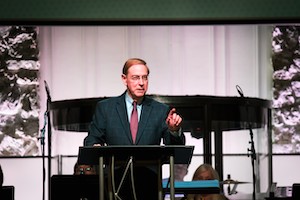
And Jesus Calling is a good book to share with people, because if we understand that God loves us and He loves us unconditionally and like the Scriptures say, He loved us while we were sinners, sometimes like dirty, rotten sinners, He loved us unconditionally. He didn’t wait for us to clean up our lives and then love us. He loved us where we were and wanted the best for us. And of course, that’s why He sent Christ to die for us, He paid the penalty of our wrongdoings so God could forgive us and still be a just and righteous God, because Christ paid our penalty for us. The simple message of the Gospel, whenever we respond to that and open our hearts to that and confess our prayers to God and ask forgiveness of God and tell Him that we were grateful for what Christ did for us, we want to accept His gift of forgiveness, we want His Spirit to enter our lives and guide us, it makes a change in our lives. And it starts and then we just continue to grow. And that’s why it’s a relationship, it’s not just something that happens once in a lifetime. We come into the family once, yes. But then, like in human relationships, our relationship with God grows.
And that’s why I think one of the most important aspects in our relationship with God is to have what I call a daily sit down and listen time. Just having a sit down and listen time, not just talk. Sometimes prayers is just talking to God, but really it’s a conversation. We want to hear God first, and then we want to respond. Or if you’re really hurting, it’s okay. You can tell God what’s going on inside of you. But then listen to Him also. And of course, His words speak so clearly and so personally to us as we have those sit down and listen times.
Narrator: To learn more about Dr. Gary Chapman and The Five Love Languages, please visit www.5lovelanguages.com.
Stay tuned to Jason Wilson’s story after a brief message.
When Life is Overwhelming, Jesus Listens
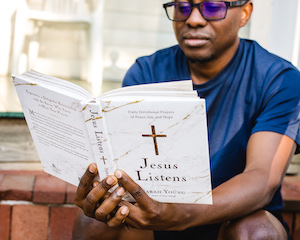
Sometimes life can be really stressful, whether it’s personal struggles or world issues that make us feel overwhelmed. But when we feel helpless, God is still there, ready for us to turn to him in prayer.
That’s why Sarah Young wrote Jesus Listens: to deliver a message of peace, love and hope to her readers every day. Jesus Listens is a 365-day prayer devotional with short, heartfelt prayers based on scripture, written to deepen your relationship with God.
Learn more about Jesus Listens and download a free sample.
Our next guest is the writer Jason Wilson. Wilson has written two books and is the founder and CEO of the Yunion, a nonprofit youth development organization in Detroit, Michigan. Jason’s award-winning work leans into a definition of masculinity for boys and men that doesn’t have to mean “Boys don’t cry” or “No pain, no gain,” and points to a more comprehensive definition of masculinity that allows for vulnerability and emotion—shedding truth on the lies that men have been told about who they need to be.
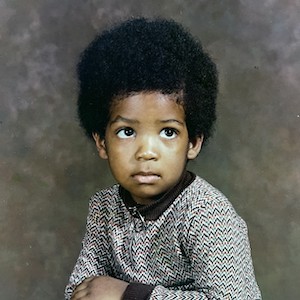
Jason Wilson: Yes, I grew up in Detroit, born and raised here. Right now I reside outside of Detroit, but I was born and raised in Detroit. That’s my home. And I love the city.
During my time in the seventies growing up was really a great time in Detroit. When I got into high school, I became a very popular DJ in Detroit and then did a few spot tour dates with well-known secular rap groups.
And I remember my mother, she would take me to church, but I hated it. I would actually run out the back alley. I would wait for her to get in the choir stands and I would look and as soon as she couldn’t see me, I would shoot out and I would go down the alley to the arcade, we would play games [with a] few of my friends, and I would make it right back before she exited the choir stands.
It took near-death experiences, pretty much prophetic, for me to surrender my life to Him.
I was supposed to be in outpatient surgery. They’re prepping me for this surgery, and the nurse was so nice, I can’t remember her name, and she looked at me and she says, “Keep the faith, don’t worry.” I’m like, “What are you talking about? This is an outpatient surgery.” So they brought me back. And here comes my wife, Nicole. She’s a registered nurse. She said, “Okay, I’ll see you on the other side.” And then the tears, [they] start rolling down my face. And I never cried like that in front of my wife. And she said, “What’s wrong?” I said, “I can’t say.” When I wake up, I’m in the ICU with a trach down my throat so I can breathe. So my wife is telling me, “Jason, you’re in the ICU, this is what happened.” I put my hand up like, “I’m straight. I don’t want to hear.” I almost died. My lungs started filling with fluid when he took off the anesthesia. If my wife hadn’t been there, I probably would have died because the doctors thought I was having a panic attack.
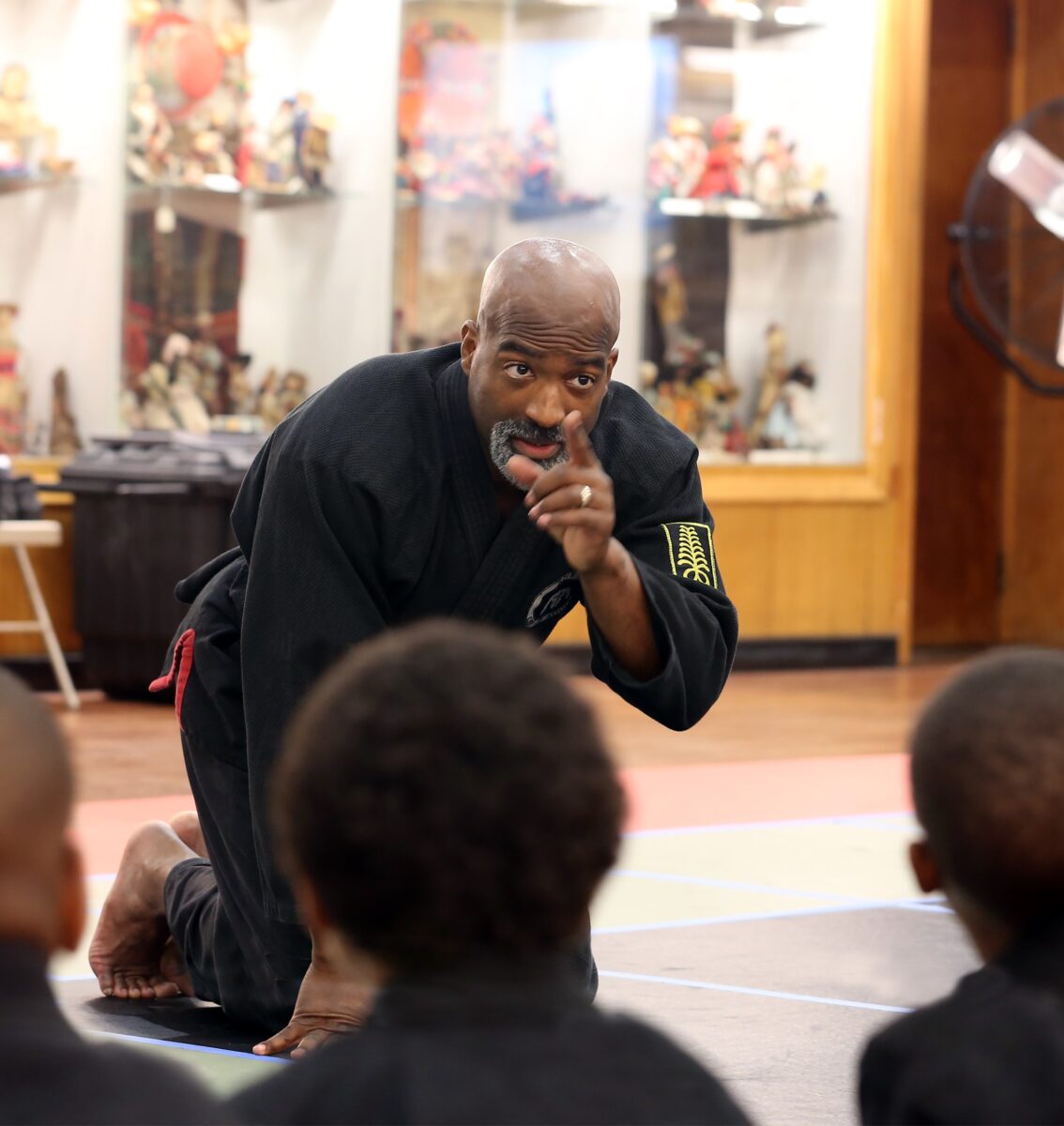
Shortly thereafter, my mother’s dementia accelerated so much that she couldn’t stay with us. So when I was a young man, I would party and DJ and I would keep her up worrying all night. Here it is now, I’m a grown man, I would stay up all night worrying about her. And so He used that journey to wean me out of the way. I love my mom so much that I stopped martial arts training, couldn’t hang out, because if I got a call from an assisted living home where she was, I had to run there and check on Mom. So imagine six years of your life gone. Everything. And then on the year she was about to die, I was at the doorstep of a heart attack because I didn’t know how to really release my emotions, so I’m bawling and holding all of this stuff up. And it had taken a toll on my heart. The doctor said if I hadn’t come to him now, I probably would have died after the funeral because of the stress.
So my mom passed [in] April 2016. A video from our academy goes viral, I believe, in June, gets over 100,000,000 views. Our phones were ringing so much at our nonprofit, we basically had to shut the nonprofit down to answer calls. The majority of calls were for men from all over the world, Australia, you name it, men crying not only to me and my assistant, but women’s staff there. They were unashamed, tired, because the video had moved them so much when I welcomed one of my student’s tears and said, “It’s okay to cry, son. We cry as men.” After that, my life has never been the same, it was almost like God was saying, “I have something for you to do, but I don’t know if you’re ready for it yet.”
“My life has never been the same, it was almost like God was saying, ‘I have something for you to do, but I don’t know if you’re ready for it yet.’” – Jason Wilson
And I believed that. And He prompted me to pray to be broken because in my right mind, I would have never prayed that. Because of that, I went to the White House. I was invited by the Obama administration to talk about the work that I did and do. The hit show This Is Us used one of our initiation techniques, actually, the award-winning episode. I wrote Cry Like A Man, I signed a contract with actor Laurence Fishburne. And now a documentary is coming out on my life next year, which will be on one of the top streaming platforms.
And then I wrote Battle Cry, and I can go on and on. We’re in a 15,000-square-foot building. We used to lease space, but we raised money to buy this building because of the demand for our academy. So the list goes on and on and on. And like Moses, when his desire was to free the Israelites, but he did it his way at first and it almost cost him his life. That’s the majority of us. When we become followers of Christ, I had the t-shirt, hat, bumper stickers, you know, everything Jesus, okay? But it was really my way, not His way.
“Like Moses, when his desire was to free the Israelites, he did it his way at first and it almost cost him his life. That’s the majority of us. When we become followers of Christ, I had the t-shirt, hat, bumper stickers, you know, everything Jesus, okay? But it was really my way, not His way.” – Jason Wilson
And so it wasn’t until Moses went back with just a staff, but most importantly, walking in the Most High’s will, was he able to free his people from Pharaoh. Same thing with us. The Pharaohs in our lives, we keep trying to control them and just beat them down or whatever. It doesn’t work that way. We have to walk in the will of the Most High and that demands that we walk by the Spirit. If we stay soulless, we will always lose the battle.
Our training academy for boys, it’s therapeutic. We make it a safe space where boys can talk about the trauma of getting talked about at school, to as far as their grandfather just passing. So when you teach a boy young, or a girl young—because we have trauma-informed training as well here for children and their parents. When you make mental health as important as this world says we should maintain our physical bodies, it becomes a part of the culture, so we have to change our culture.
“When you make mental health as important as this world says we should maintain our physical bodies, it becomes a part of the culture, so we have to change our culture.” – Jason Wilson
So in the African-American community, my grandfather was lynched—not my great great great great grandfather, my grandfather—and beaten by police officers in Fort Pierce. He didn’t do anything wrong except say he was equal and felt that way and lived that. That trauma passed through generations and it hit me, so intergenerational trauma is something that can be passed down, but also healing can as well. So when we remove the stigma from mental health in the black community, we can start healing. When I grew up, you know, guys who got shot were like superheroes. It wasn’t associated with trauma or anything, you know? And so two of my brothers were murdered. You know, I idolized one of them who was a drug dealer millionaire, but died tragically. And I held all of that in. And I thought that was the man thing to do.
Think about this. If you had to endure slavery and your children, you see them being auctioned off like puppies to the highest bidder, and you can’t really do anything about it, but you know you’ve got two other kids that you have to take care of, you can’t deal with that emotion right now. So that carries on. That’s held. So what does that tell us over time? We’re strong. We can just handle it, we’re tough. No, no, no, it’s time to release the stuff our ancestors couldn’t, but we can. Let’s release this stuff and free our minds from this trauma. And then you’ll start seeing the healing that we desire and it will show in other areas in the community as well.
The mind can only bear so much. And so the Bible talks about renewing our minds and being no longer conformed to the ways of this world (Romans 12:2 NIV) That only happens when you seek the help needed to release this trauma because new means something brand new. We can’t be renewed if you’re holding on to the old. And that’s what I did and a lot of other people in my community, but now that is changing in a major way.
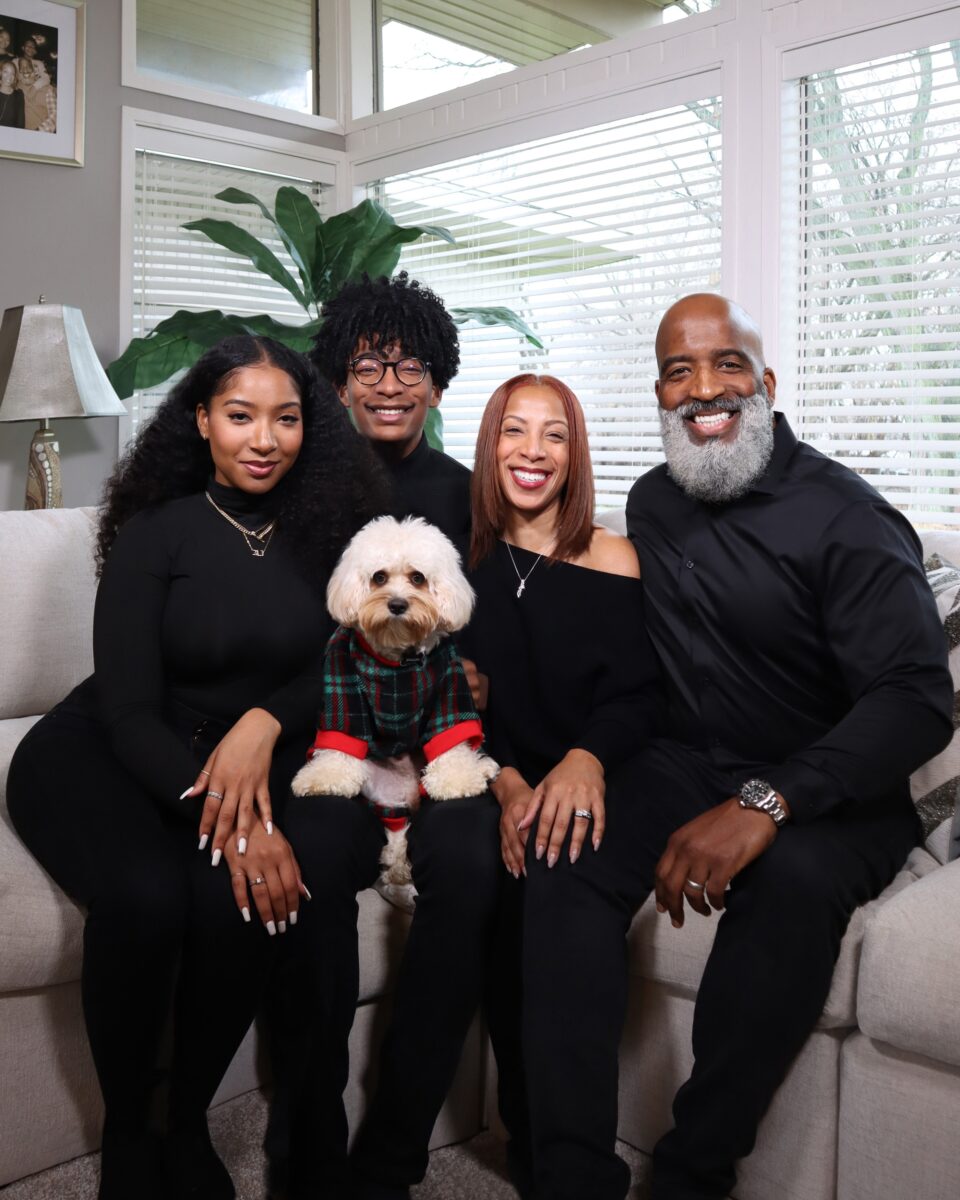
So when I started becoming a comprehensive man, my life completely changed, my relationship with Christ became really personal because I could express, “These are the emotions that were lying dormant.” Like the great king and warrior David, he was every bit of masculine. But as we read from the Psalms he wrote, he was very compassionate, caring. He got scared at times. He felt fear. And there is no courage without love, because what makes a man go through fire for his family is love, it’s not just courage. Courage is a byproduct of an expression of love or care for something that you may lose. But he showed us what it meant to be a comprehensive man.
Unfortunately, as men in society, we’ve allowed one adjective, which is masculinity. I literally thought it was a comprehensive definition of manhood. And it’s not, it’s just four or five attributes: strength, boldness, aggression, you name it, things like that. But it didn’t include nurturing, compassion, caring, long-suffering, patience. And wow, so if a man is only these four, his life is definitely incomplete. It’s not comprehensive. So when I started becoming a comprehensive man, my life completely changed.
When my mother developed dementia, I was just a masculine male. But anyone who has a loved one with Alzheimer’s and dementia knows that you quickly realize you’re not in control at all. And what that loved one needs, of course, they need you to make sure they’re taken care of, but they need someone who’s caring and compassionate, understanding, long-suffering, patient, kind, gentle. I didn’t have that, you know? And I remember praying on my back porch, our deck, I asked the Lord to take my mom. I said, “Most High, she’s not living any more, so just take her life.” And it was so clear through His Holy Spirit, He said, “Jason, that’s not love. That’s fear. You’re asking this request because it hurts you to see her this way. Your mother has no idea.” He says, “In order for you to care for her or give her the care that she needs, you’re going to have to become a comprehensive man.” And I’m like, “What is that?” A comprehensive man, as I define it, is someone who’s courageous but also compassionate, strong but sensitive, a man who can freely live from the good in his heart and not his fears. So when you give a man the freedom to feel the freedom to be more than masculine, which we all are, he becomes someone more comprehensive like Christ.
It’s difficult for God to use masculine males who are only masculine, because when He needs us to be compassionate, we can’t. When He needs us to be sensitive, we can’t. When He needs us to be nurturers, we can’t. And then, as the scriptures say, the power of Christ is perfected through our weakness. But what do we always say to each other? “Stay strong.” So when we fear being weak, now the power of Christ can’t really be perfected through us.
“As the scriptures say, the power of Christ is perfected through our weakness. But what do we always say to each other? ‘Stay strong.’ So when we fear being weak, now the power of Christ can’t really be perfected through us.” – Jason Wilson
I was very promiscuous, disrespectful. But I didn’t respect women. I treated them like objects. And I didn’t love myself. I thought my entire worth was in what I did instead of who I was. And that was a direct result of believing the lie that big boys don’t cry, no pain, no gain. If you apply no pain, no gain to every area in your life, you soon won’t have one, because sometimes that pain is not meant for us to push through it, but for us to slow down and think through what we’re going through.
When I saw the title of your show, Jesus Calling, I’m like, Oh, my goodness, that’s perfect. I ran from it, I’m just like those who are in the Bible who want to really carry a cross and follow. Typically whatever the Most High tells you to do, you didn’t have it in your plans. We need to go to Who created us.
“Let my light shine in such a way that many see my good works and glorify my Father in heaven.” (Matthew 5:16 NIV) That light shining in such a way is shedding the truth on the lies that this world has told us as men who we are. “What does it benefit for you to worry about tomorrow? Because tomorrow will have worries of its own.” (Matthew 6:25-34 NIV) However, He never said, “Do not be concerned about anything.” So we will always have concerns. We will always be nervous. And it’s okay, you know, allow yourself the freedom to be human, but also allow yourself to walk by the power of His spirit to move through those fears, those anxieties, nervousness, depression, etc.
“He never said, ‘Do not be concerned about anything.’ So we will always have concerns. We will always be nervous. And it’s okay, you know, allow yourself the freedom to be human, but also allow yourself to walk by the power of His spirit to move through those fears, those anxieties, nervousness, depression, etc.” – Jason Wilson
Narrator: To learn more about Jason Wilson and his work, go to www.mrjasonwilson.com. You can find his book, Battle Cry, everywhere books are sold.
If you’d like to hear more stories about emotional boundaries and spiritual health, check out our interview with Dr. Henry Cloud and Dr. Daniel Amen.
Next Week: Todd Hoffman (Discovery Channel’s Gold Rush and Hoffman Family Gold)
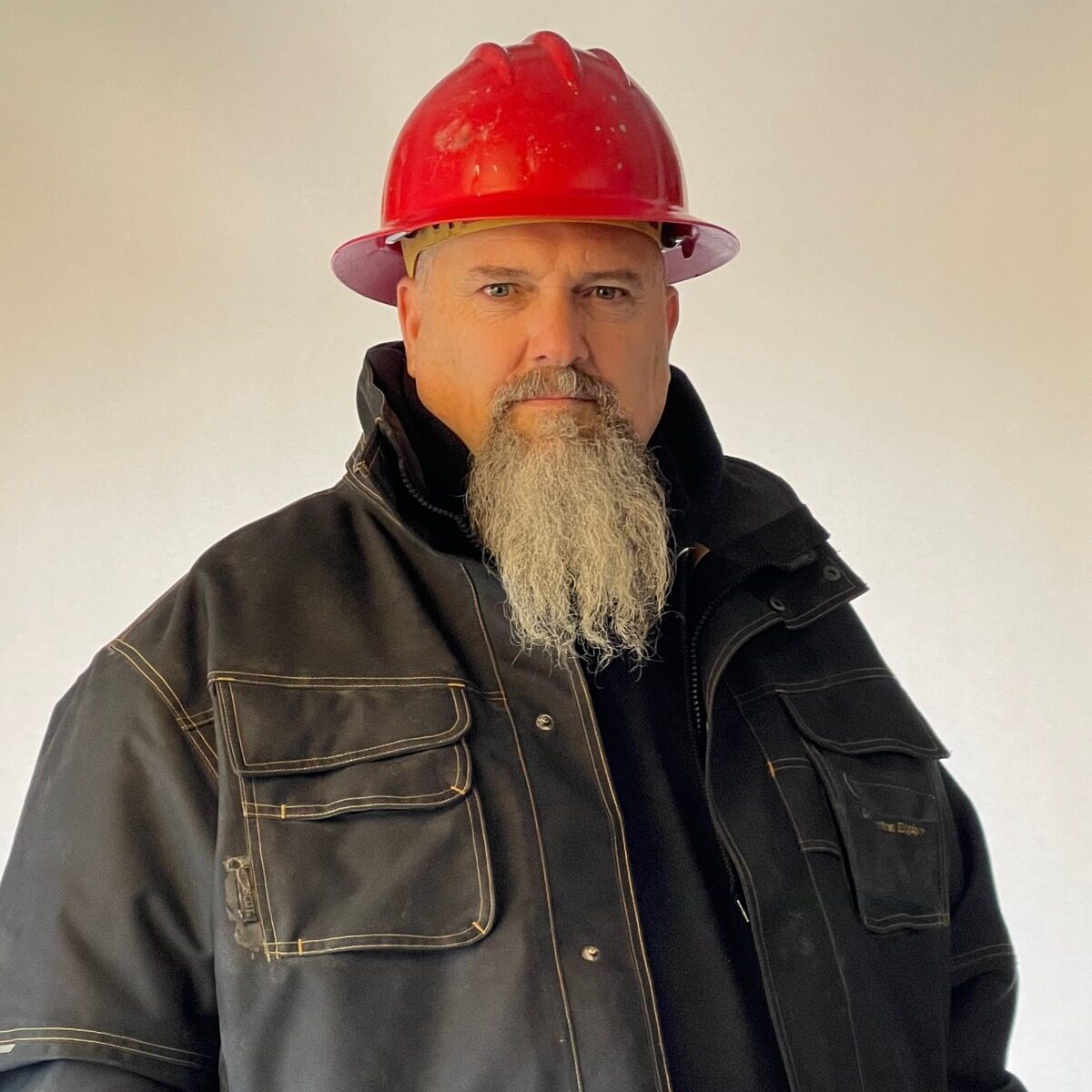
Next time on the Jesus Calling Podcast, we’ll hear from the star of Discovery Channel’s Gold Rush and Hoffman Family Gold, Todd Hoffman, who shares how his faith keeps him grounded, even in a career with many uncertainties.
Todd Hoffman: People ask me this, like, “What gives you the confidence to actually face risks like those types of things in mining?” You know, I believe that I’m on a journey with Christ. I’m on a journey that is controlled by something beyond myself, which I believe I’m walking hand-in-hand with God. And even though I make mistakes, I believe that all things work together for the good of those who love Jesus, and I truly believe that.

